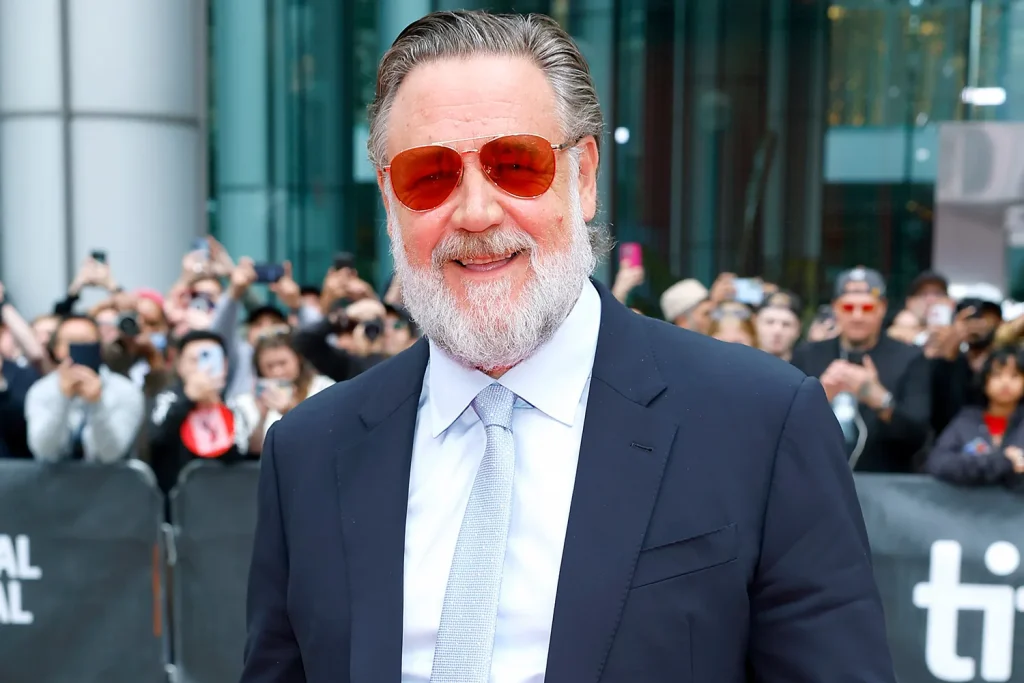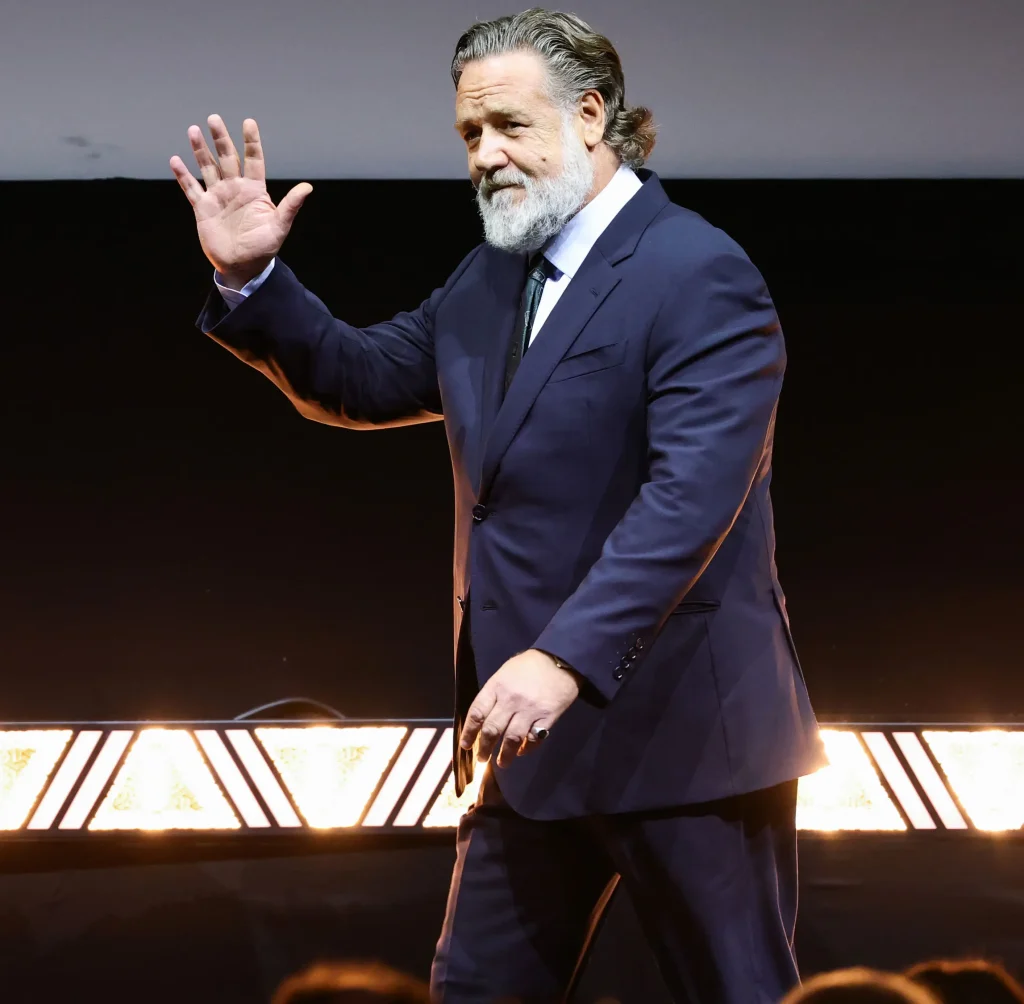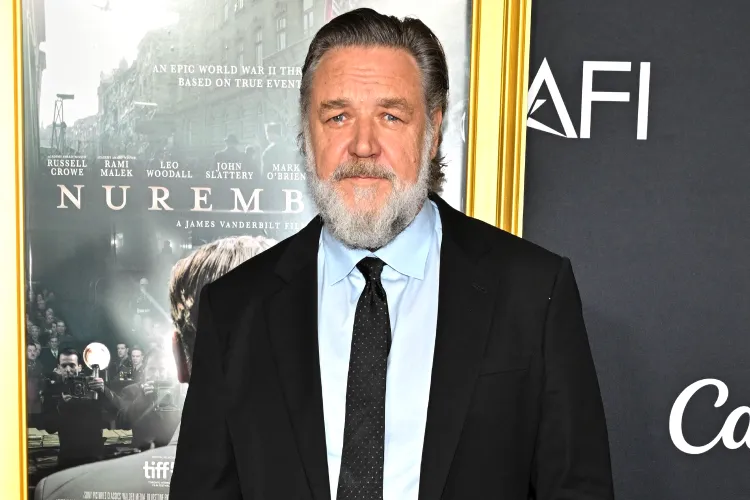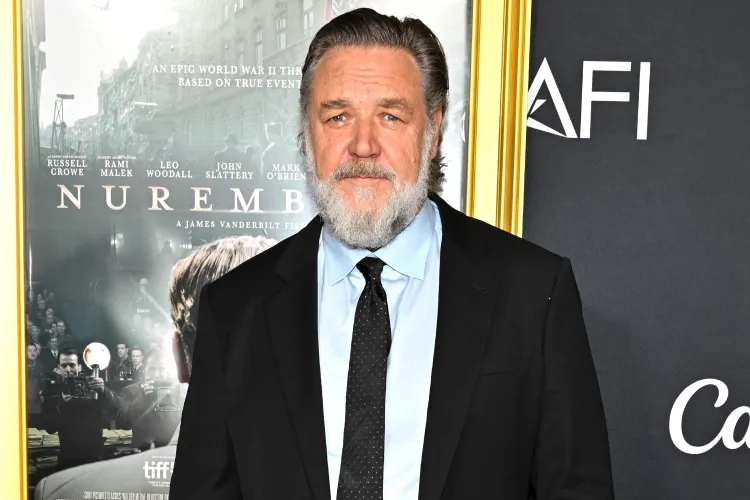How Russell Crowe Dropped 60 Pounds in a Year — The Two Simple Habits That Changed Everything
When Russell Crowe stepped out to promote his latest project, Nuremberg, few could believe their eyes. The Academy Award–winning actor, known for his commanding screen presence and rugged frame, appeared dramatically leaner — a transformation that, according to Crowe himself, had taken nearly a year and involved a complete shift in mindset, lifestyle, and priorities.

Crowe, 61, revealed that he lost more than 50 pounds since finishing work on Nuremberg, the World War II courtroom drama in which he portrays Hermann Göring. The change wasn’t sparked by vanity or a role requirement but by something more fundamental: his health. Speaking candidly in a recent interview and on The Joe Rogan Experience podcast, the Gladiator star explained that his transformation stemmed from two major lifestyle habits — reducing alcohol consumption and embracing a more sustainable, long-term approach to wellness.
“I was 126 kilograms when I wrapped Nuremberg,” Crowe said with a grin. “Right now, I’m 100.9.” That’s a loss of nearly 60 pounds, an achievement he attributes to what he calls “relearning my limits.” The actor described a turning point that came after filming wrapped in Europe, when years of accumulated fatigue, injuries, and unhealthy routines had caught up with him.
For decades, Crowe had been known for physically demanding performances — from Gladiator and Cinderella Man to The Nice Guys and Robin Hood. But the toll of that work, combined with age and an active lifestyle off-screen, left him dealing with chronic pain in his knees and shoulders. “I’ve had a long history of injuries from films,” he admitted. “You can only push your body so far before it starts talking back.”
Rather than dive into extreme diets or intense boot camps, Crowe focused on sustainability. He began working with Ways2Well, a wellness platform that helps manage inflammation and joint pain through customized health strategies. “It’s taking a bunch of pain away so I can go and work out and not have to suffer for hours afterward,” he told Rogan.
That ability to move comfortably again, Crowe said, became the foundation for everything else. “When you’re in pain all the time, you lose motivation. Once the pain was managed, everything else followed naturally.”

The other major change was in his relationship with alcohol. Crowe spoke frankly about realizing that his long-standing pattern of social drinking had to evolve as he aged. “I’m a big proponent of having a drink,” he said. “But as you get older, you learn your capacities. Now, one night a week — if I’m having fun — is plenty.”
He described swapping out casual drinks for higher-quality experiences, opting for fine wine on occasion rather than nightly indulgence. “It’s not about cutting it out entirely,” he said. “It’s about balance. About choosing moments instead of making it a routine.”
Those two shifts — managing pain and redefining balance — became the pillars of his transformation. But what’s striking about Crowe’s tone is its realism. There’s no talk of crash diets, calorie-counting, or “miracle” fixes. His words are steady, pragmatic, and self-aware. “I’m not twenty-five anymore,” he said. “The goal isn’t to look like that. The goal is to feel strong enough to keep doing what I love.”
And what he loves is, of course, storytelling. In Nuremberg, which wrapped production last year, Crowe’s performance as Göring — a figure central to one of the darkest chapters in human history — demanded not just physical transformation, but emotional endurance. “That film took a lot out of me,” he admitted. “It was a heavy story, a heavy shoot. When it was over, I felt like I needed to rebuild myself.”
That rebuilding came slowly. Crowe began walking daily, a habit that eventually turned into consistent cardio and light resistance training. His focus was less on gym performance and more on consistency. “I just wanted to keep showing up,” he said. “If you move your body every day — even a little — it changes your mind, your energy, your whole outlook.”
In time, the results were visible. At the Zurich Film Festival, where he received the prestigious Golden Eye Award for Lifetime Achievement, Crowe appeared visibly slimmer, smiling broadly as fans and photographers noted the transformation. The following month, at an event in Malta, he addressed the attention with good humor. “I appreciate the kind words,” he said, “but I’m just trying to keep up with life.”
Crowe’s approach resonates because it feels attainable. There are no celebrity trainers or luxury detox retreats — just discipline, humility, and gradual change. He repeatedly emphasized how this phase of his life isn’t about reinvention but refinement. “What I want to do is make these changes and make it a long-term situation,” he told Rogan.

The actor’s honesty about his challenges has also struck a chord with fans. Social media has been flooded with messages of encouragement, with many applauding his balanced view of health. “It’s refreshing to hear a celebrity talk about fitness without turning it into a brand,” one user commented. Another wrote, “He looks great, but more importantly, he looks happy.”
Indeed, happiness seems to be at the core of it all. In his downtime, Crowe splits his life between Australia and Europe, often sharing glimpses of his outdoor adventures — cycling, horseback riding, or exploring vineyards — activities he says have become his version of meditation. “You learn to appreciate quiet movement as you get older,” he said. “It’s not about pushing hard all the time. It’s about doing something that fills you.”
This mindset also ties into how he views aging. “I’m still picking up injuries because I’ve got to face the fact that I’m 61,” he said with a laugh. “But I’ve stopped fighting that. You work with it. You respect it. That’s how you stay in the game.”
Crowe’s transformation has already sparked headlines around the world, with outlets noting how drastically he’s changed since his earlier appearances. But what stands out is how grounded he remains about the attention. “People say, ‘You look amazing,’ and I appreciate it,” he said. “But for me, it’s about feeling like myself again. That’s the win.”
His success story also highlights the growing trend of men in their fifties and sixties redefining what health looks like — not as a quest for youth, but for vitality. Crowe, like peers such as Hugh Jackman and Chris Hemsworth, seems intent on showing that longevity can be powerful, masculine, and inspiring.
Looking ahead, Crowe says he plans to continue his new routine without making it an obsession. He still enjoys the occasional indulgence, good food, and his trademark glass of wine, but now those moments are part of a wider balance. “I don’t want to live like I’m punishing myself,” he said. “I just want to live well.”
It’s a sentiment that mirrors the kind of character arcs Crowe has long embodied on screen — resilience, discipline, redemption. Only this time, it’s his own story.
“I feel better,” he said simply. “That’s what matters.”


